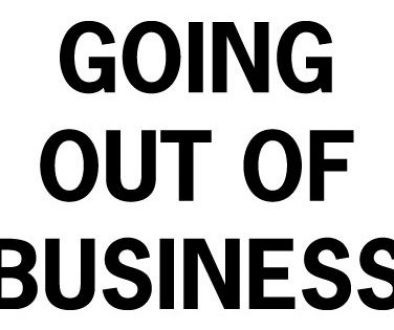Starting and Building a Business is Hard!
People start businesses every day. I live in the Southeast, in a part of town where retail storefronts have been multiplying without end. Many of the businesses are branches of larger corporations, or franchises. Some of them are independent stores. Every single one of the franchises and independent stores were opened by someone who had the courage to invest a significant portion of their savings into their dream, then work hard and sacrifice to help it to succeed.
Those are just the visible aspects of entrepreneurship. For every storefront business that opens up, there are just as many if not more businesses started by people in less visible locations. There are office parks without storefronts tucked away around every corner, and home based endeavors like services, multi-level marketing, and online businesses.
I started a business in just about the most unsound way possible. The errors I made were numerous. One year after my wife and I had our first child, I quit my comfortable, well-paying job, moved to a state where I knew no one, and tried selling to customers that had no money and no interest in talking to me. For two straight years my business partners and I lost money. My business partners were my wife and her younger brother; we all lived together in our house to save money, and got by with as little as possible.
Our business plan was very promising, as it was developed around my recent experience.
In 2001, I was working for a large networking company, designing and selling LAN and WAN upgrades, and evangelizing the fledgling technology of IP Telephony, as it was known then. My customers were everyone in a big square state in the USA; there are about 500,000 people in the entire state. In addition to the great people I got to know, the engine that drives the economy in that state is the mining industry. I didn’t sell anything to the mining companies, but to the public sector. K-12 schools, higher education, counties, and cities were my customers; they all had good budgets.
The business plan was to move to a relatively small town in the southeast, and sell networking gear and services to public sector entities in the lower half of the state. We had some success here and there, enough to keep us limping along. I am always grateful to the customers that took a chance on doing business with us. Unfortunately, we were just not profitable. The business plan was failing. There are many reasons for that, and we did recover, but some of the lessons learned in that first year are worth remembering.
- If you are making good money at a good company, have a family, yet are bored at work — stay bored! Sock the money away into savings for a few years to give you a good cushion to do something stupid like start a business.
- If you are going to start a business, do it in one of the time-honored ways. One way is to work for a business just like you want to start, learn the ins and outs, then quit and start a competing company. Steal a few customers if you can to get you going. Another way is to start the business on the side and grow it while continuing to work your day job. Keep getting that day job paycheck until you get fired for spending all your time on your successful new company.
- Start a business with the triumvirate of sales, finance, and technical. This is one of the things we did right.
- Become very good at very few things. Have a very narrow focus, and become the best within your chosen market. It took us years to learn how to say no to things outside our area of focus. Once we learned that, everything started to go well.
- Get as much credit as fast as possible. For the first few years we bought all inventory on the $120k in credit cards that I was able to get just by accepting the free offers that kept getting sent to me while I worked for the big company. After a year or so we were able to get a line of credit using personal guarantees with a local pro-business bank.
- Payroll is the biggest expense. Only add people when you absolutely have to.
- It is easier to get young, green salespeople and train them. More experienced salespeople won’t work for a startup without some significant incentive, like bundles of cash or equity.
- Fund the company’s growth with debt, not equity. Most people only care about a paycheck and commissions or bonuses. If you start granting equity to early employees it can spiral into a mess. Keep ownership closely held.
Unfortunately, after two years, we were in a quandary. There was not enough business to keep us going. The two states were very different. Whereas a rural school districts in the big square state had lots of money to spend on technology due to coal, gas, and oil taxes, state in the Southeast had none of that.
We were either going to have to shut the company down and get jobs, keep the company doing what it was doing and drive it into bankruptcy, or change our situation. We chose to move the business to a big city, and essentially restarted it, with one big difference.
When we restarted the business in the big city we had value. A company’s value is in its employees, customer relationships, vendor relationships, and institutional memory. That memory should be codified into processes and procedures based on the many painful lessons learned the hard way. That is why franchises and MLM businesses can be so successful — there is already a proven methodology. We had a two year head start and had taken all the lessons we learned to heart.
We used that value in the new location. Within six years we had grown the company from two people to 40, while maintaining profitability and becoming debt-free. With the benefit of hindsight, it is easy to say that we should have started the business in January of 2002 in the big city instead of the small town. That may be the case…or it could be that the crucible of self-imposed hardship we endured for the first two years helped us to craft a business model that worked.
It is possible to start a business and succeed. People do it every day. Every time I see a new business opening I cheer for the entrepreneur that is taking a chance with his or her hard-earned savings, and pray that they either know or can develop a formula for success that works. I think about all the hard work they are going to have, the late nights, the development of strategy and tactics to succeed against their competition, and I do not envy them. Instead I drive home and play with my kids while it is still light outside and enjoy the family life I missed for those years while we were building the company from nothing into something.
Author: Rolf Versluis
Published at Priority Queue


